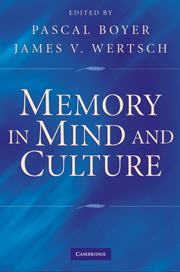Book contents
- Frontmatter
- Contents
- List of Contributors
- PART I IN MIND, CULTURE, AND HISTORY: A SPECIAL PERSPECTIVE
- PART II HOW DO MEMORIES CONSTRUCT OUR PAST?
- PART III HOW DO WE BUILD SHARED COLLECTIVE MEMORIES?
- PART IV HOW DOES MEMORY SHAPE HISTORY?
- 9 Historical Memories
- 10 The Memory Boom: Why and Why Now?
- 11 Historians and Sites of Memory
- PART V HOW DOES MEMORY SHAPE CULTURE?
- Index
- References
10 - The Memory Boom: Why and Why Now?
Published online by Cambridge University Press: 05 June 2012
- Frontmatter
- Contents
- List of Contributors
- PART I IN MIND, CULTURE, AND HISTORY: A SPECIAL PERSPECTIVE
- PART II HOW DO MEMORIES CONSTRUCT OUR PAST?
- PART III HOW DO WE BUILD SHARED COLLECTIVE MEMORIES?
- PART IV HOW DOES MEMORY SHAPE HISTORY?
- 9 Historical Memories
- 10 The Memory Boom: Why and Why Now?
- 11 Historians and Sites of Memory
- PART V HOW DOES MEMORY SHAPE CULTURE?
- Index
- References
Summary
Memory is as the affection: we remember the things which we love and the things which we hate.
Ralph Waldo EmersonAlmost nothing renders us human as much as our unique capacity for memory. Other animals surely have memory in biological and even social forms. They can do amazing things in flocks and herds. But no other creatures can use memory to create, to record experience, to forge self-conscious associations, to form and practice language, to know, collect, narrate, and write their pasts. We not only can know at least some of our past; we know that we can know it. Sometimes it seems that memory really is the root, the fountain of human intelligence. It is this deeply human power of memory that makes it so ubiquitous, so essential to human life, but also such a problem and such a subject of inquiry. As the Israeli philosopher Avishai Margalit has written: “Memory is knowledge from the past. It is not necessarily knowledge about the past” (Margalit, 2004). In everyday life, and in the world of scholarship (whether cognitive psychology, neuroscience, anthropology, literature, or history), all considerations of memory seem perpetually to ride on the teeter-totter of trust and distrust, up and down, with distrust carrying the most weight, and trust struggling to keep the teeter-totter moving at all. Can we believe what memory provides us? Can we afford not to?
- Type
- Chapter
- Information
- Memory in Mind and Culture , pp. 238 - 251Publisher: Cambridge University PressPrint publication year: 2009
References
- 33
- Cited by



